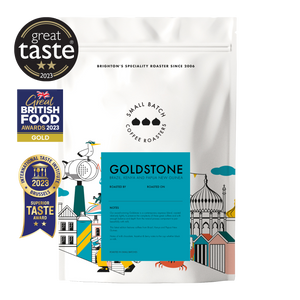Sustainability in our Roastery
Jan 29, 2025

Let’s deep dive into production, shall we?
Our Roastery emissions were estimated at 789tCO2e in 2023 - to put it into perspective, that’s about 478 return flights to New York’s worth of emissions. It is our goal to reduce our roastery emissions by 70% over the next five years, so here’s what we’re thinking…
Growing, harvesting & processing of green coffee accounts for the majority of the Roastery’s footprint (53%), using Eco Invent factors and supplier data. This, unfortunately, is the area of our business where we have the least control over our emissions. However, we aim to spend the next five years working collaboratively with other key stakeholders to improve accessibility to data, particularly working with traders to establish regular data updates as a part of partnership agreements. We will also set out to explore single estate origins (such as DETERRA) where more granular data may be available, providing better means of tracking impact and the efficacy of different growing practices (e.g. regenerative, organic). The more you know, the more you can do! We will also be discussing the decaffeination processes with key suppliers, so we can seek lower impact options where possible.
It’s important to us that everyone we work with to create our coffee is offering the same commitment to sustainability and transparency as us and this is something we will be requesting from our suppliers.
In the long term, we will also look to work with partners advocating for key impact reduction initiatives associated with sea freight. It’s not enough for our suppliers to improve, we want to be a part of a global shift in emissions creation.
The UK generates around 11.6million tonnes of packaging waste yearly, making it an area we think all small businesses need to take responsibility for. We are pleased to confirm that the boxes we use in our production line are made from 100% recycled materials, but there’s always room for improvement. We will be investigating using lighter boxes where possible, so we can further reduce the amount of cardboard we use in the roastery.
At the roastery, we send our organic waste from the production of our coffee to be used on allotments locally - coffee chaff is rich with nitrogen, making it a fantastic fertilizer for growing plants such as leafy green vegetables, peas, carrots & tomatoes. We will however, be looking for other ways we can avoid sending any organic waste to landfill, to ensure we are doing all we can.
Our energy use at the roastery accounted for a modest 10.7tCO2e, but to ensure we’re working towards carbon neutrality, we plan to look into implementing renewable tariffs at our premises. These allow energy companies to match the energy we buy from them with supporting renewable energy projects.
You can read more about our short term carbon reduction plan in this blog post.


